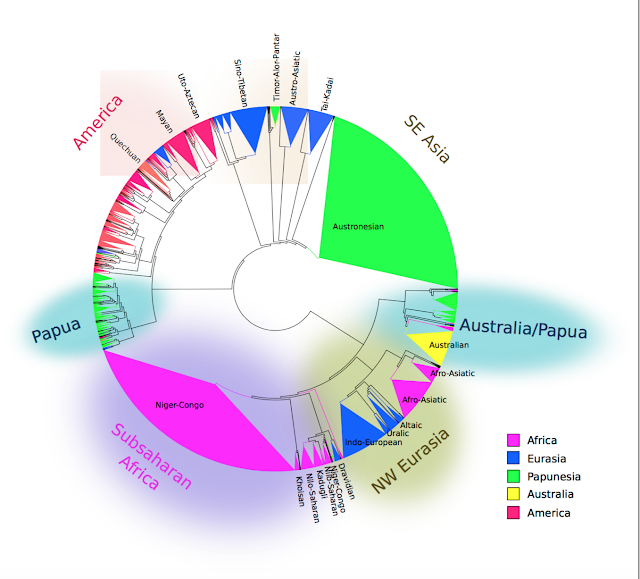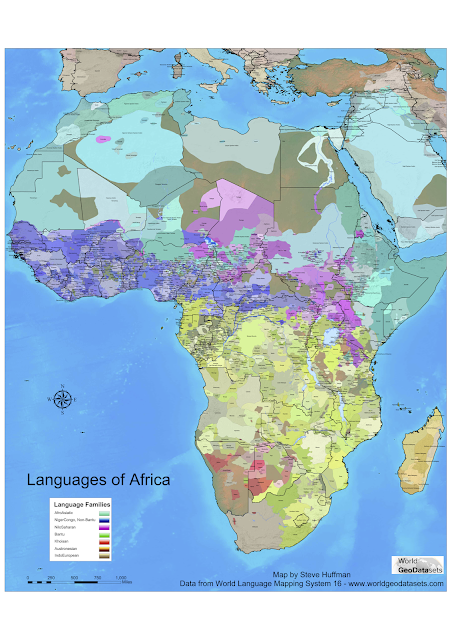Podcasts of linguistic seminars from CoEDL
Happy news, it is possible to access lectures from the Centre of Excellence for Language Dynamics (CoEDL) on any podcasting app! Now you can also look this smart while listening to lectures about linguistic diversity on your normal podcast app!
The centre has long had lectures up at iTunes U, but it wasn't until now that I figured out how to get them out of the apple-bubble and into podcasting apps for android etc (i.e the RSS URL)*. I tried it out yesterday, I ended up listened to Russell Gray's talk on grand challenges of linguistics while grocery shopping at Aldi - a throughly pleasant experience that I wish you all! (I'm a podcast freak, every alone moment spent not working is spent listening to podcasts.)
The centre has several different programmes and projects, and the lectures are organised into different "courses" or "podcasts" accordingly. Below, I've included links to them all and some information about each podcast.
In order to subscribe to these with your podcasting app, you need to enter the RSS URLs below under the options for "adding new podcasts". It's not very difficult, I promise. One of the most popular podcast apps for android phones, "podcast addict", let's you do this easily (just look for the "add RSS feed" option under adding). Non-smartphone users don't despair, it is also possible to listen to podcasts via desktop apps. If you need further assistance, comment here and we'll help.
The lectures are from the public seminar series of the centre. Please note that when they are video feeds, you might not be able to play only audio as background (depends on your player).
Naturally, there are other institutions that offer lectures freely online via iTunes U, podcasts etc. Before I moved to Australia, I listened to the Linguistic Diversity-podcast/iTunesU by La Trobe for example (iTunes link & RSS link). This post is about the podcasts of CoEDL, since it's where I'm at currently and I just found this out, but I'd be happy to make posts about other seminar series in future. Leave recommendations in the comments!
 Language and society
Language and society
Any analysis of language as a dynamic and evolving system must confront a self-evident truth: languages are spoken with intention by living, breathing human beings. The linguistic choices of individual and groups point to the diverse ways that we understand our world and the complex meanings that we exchange with another.
RSS URL: https://itunesu.itunes.apple.com/WebObjects/LZDirectory.woa/ra/directory/courses/1017184690/feed
Regular iTunes U URL: https://itunes.apple.com/au/course/language-learning/id999201738
***
***
***
***
 |
| For more on the map of linguistic diversity in the bubble, go here. |
The centre has several different programmes and projects, and the lectures are organised into different "courses" or "podcasts" accordingly. Below, I've included links to them all and some information about each podcast.
In order to subscribe to these with your podcasting app, you need to enter the RSS URLs below under the options for "adding new podcasts". It's not very difficult, I promise. One of the most popular podcast apps for android phones, "podcast addict", let's you do this easily (just look for the "add RSS feed" option under adding). Non-smartphone users don't despair, it is also possible to listen to podcasts via desktop apps. If you need further assistance, comment here and we'll help.
The lectures are from the public seminar series of the centre. Please note that when they are video feeds, you might not be able to play only audio as background (depends on your player).
Naturally, there are other institutions that offer lectures freely online via iTunes U, podcasts etc. Before I moved to Australia, I listened to the Linguistic Diversity-podcast/iTunesU by La Trobe for example (iTunes link & RSS link). This post is about the podcasts of CoEDL, since it's where I'm at currently and I just found this out, but I'd be happy to make posts about other seminar series in future. Leave recommendations in the comments!
***
 Language and society
Language and societyAny analysis of language as a dynamic and evolving system must confront a self-evident truth: languages are spoken with intention by living, breathing human beings. The linguistic choices of individual and groups point to the diverse ways that we understand our world and the complex meanings that we exchange with another.
RSS URL: https://itunesu.itunes.apple.com/WebObjects/LZDirectory.woa/ra/directory/courses/1017184690/feed
Regular iTunes U URL: https://itunes.apple.com/au/course/language-learning/id999201738
***
Language evolution
Just as Darwin showed that species are not fundamentally immutable, it is now known that languages continue to evolve over time, adapting to societies and their environments. In recent years a wide range of disciplines have contributed new ideas towards understanding the evolution of language. We are uniquely poised to build on these new initiatives to develop a general theory of language evolution.
Language evolution operates over many levels and time-spans: from evolution of language as a communicative system, which took place over tens or hundreds of millennia, to evolution of specific languages across generations and within speech communities. Our research aims to link the cognitive capacity of individuals and how they process language to the use of language as a public and social product in a specific cultural and ecological context. This will therefore integrate our understanding with how language works at the level of the individual to the level of the community or nation.
RSS URL: https://itunesu.itunes.apple.com/WebObjects/LZDirectory.woa/ra/directory/courses/999201494/feed
Regular iTunes U URL: https://itunes.apple.com/au/course/language-evolution/id999201494
Regular iTunes U URL: https://itunes.apple.com/au/course/language-evolution/id999201494
This podcast is from the evolution program of the centre, more about that here.
***
Language learning
When children and adults learn a language, they engage with its internal complexity and varietal characteristics (see Shape), use human cognitive abilities for processing which change over their lifespans (Processing), inspire computational models of potential technological application to building adaptive systems that know how to learn, and contribute over generations to language change (Evolution).
The learning program integrates all these elements, but with a twist: it is putting a spotlight on how children and adults learn languages in contexts that are acutely under-researched, but which are of social, educational, and economic importance for Australia and its place in our region.
RSS URL: https://itunesu.itunes.apple.com/WebObjects/LZDirectory.woa/ra/directory/courses/999201738/feed
Regular iTunes U URL: https://itunes.apple.com/au/course/language-learning/id999201738
Regular iTunes U URL: https://itunes.apple.com/au/course/language-learning/id999201738
This podcast is from the learning program of the centre, more about that here.
***
Language processing
How does our language processing ability enable us to rapidly perceive, produce and understand language given the massive diversity observed across both speakers and languages?
We examine language processing in a breadth and depth previously unmatched in any one project. We will map processing at multiple levels of description and observation, in monolingual and multilingual individuals, and in typical and impaired populations. All these investigations will take place across a range of languages and dialects representing the unrivalled diversity in the Indo-Pacific region.
RSS URL:
https://itunesu.itunes.apple.com/WebObjects/LZDirectory.woa/ra/directory/courses/999201734/feed
Regular iTunes U URL: https://itunes.apple.com/au/course/language-processing/id999201734
Regular iTunes U URL: https://itunes.apple.com/au/course/language-processing/id999201734
This podcast is from the processing program of the centre, more about that here.
***
Language shape (aka diversity, description and documentation)
How widely do languages differ, why do they differ, and what do these differences tell us about people and their diverse communicative needs? Currently only around 10-15% of the world’s 7,000 languages are well described, and many of the remaining 85-90% are highly endangered, including almost all of the languages of our region.
The Shape program is exploring the design space of language by investigating a strategic selection of little-known languages of our region. We will push forward efforts to document this language heritage by a broad range of methods, drawing on innovative approaches and technologies; building the first large corpora of Indigenous Australian and Papuan languages; and initiating new research on how intergenerational variation can reveal different design solutions evolving in languages to solve similar social communicative problems.
RSS URL: https://itunesu.itunes.apple.com/WebObjects/LZDirectory.woa/ra/directory/courses/999201747/feed
Regular iTunes U URL: https://itunes.apple.com/au/course/language-shape/id999201747
Regular iTunes U URL: https://itunes.apple.com/au/course/language-shape/id999201747
This podcast is from the shape-program of the centre, which also contains the Wellsprings of Linguistic Diversity-project.
***
Language, technology & archiving
Research technologies in the language sciences are in a period of unprecedented development, and the judicious use of new technologies can result in rapid advances, even paradigm shifts in the nature and scope of research. Big data is being collected by citizens (crowdsourcing), while corpora visualisations techniques facilitate the modelling of language as it evolves. Technology has also become vital for the assessment of language and hearing, using eye tracking, ultrasound and/or iPad-based interactive activities. Perhaps the most common application of digital technology in language research is in archiving linguistic data in the form of acoustic recordings together with script-based lexical and interlinear analyses. Due to advances in computation, archives that were once regarded as simple repositories have no been repurposed as powerful tools for corpus analysis.
RSS URL: https://itunesu.itunes.apple.com/WebObjects/LZDirectory.woa/ra/directory/courses/1017185107/feed
Regular iTunes U URL: https://itunes.apple.com/au/course/language-technology-archiving/id1017185107
Regular iTunes U URL: https://itunes.apple.com/au/course/language-technology-archiving/id1017185107
***
* It turns out that if you subscribe to an iTunes U channel in the iTunes app and you view it in your library and right-click the item in the list, you get the option "copy iTunes U URL" which is all you need to then feed into your podcasting app. For some weird reason, iTunes does not really explain that this is how you do this, and their Applecare customer support didn't even know this. But yeah, that's one way of getting the RSS URL. I've copy-pasted them in here for these podcasts for your convenience.








Comments
Post a Comment